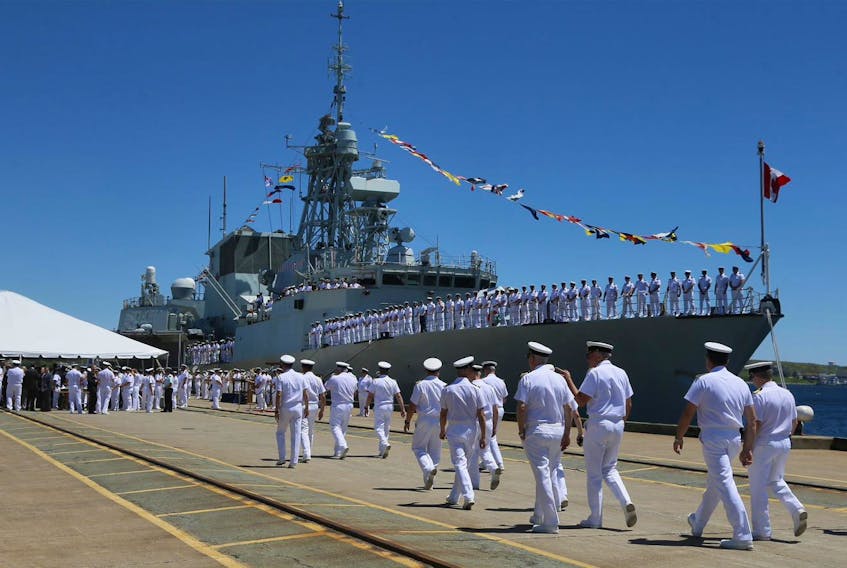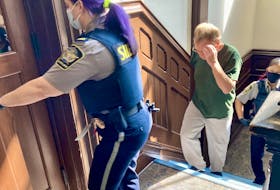The Royal Canadian Navy is sequestering the crews of two ships in Halifax as they prepare for potential deployment to assist with domestic COVID-19 response.
The Department of National Defence (DND) confirmed Monday that two ready duty ships, HMCS Ville de Québec and HMCS Moncton, are in Halifax and the crews, along with a Cyclone helicopter detachment, are being moved to a hotel for 14 days of isolation.
A DND spokeswoman said the crews of both ships have been practising physical distancing and staying at home as per a direction from the chief of the defence staff issued earlier this month, but additional measures have been deemed necessary to reduce the risk of community spread within the close confines of a ship.
“A single infected crew member could rapidly spread the virus throughout the ship and quickly reduce its operational effectiveness,” the spokeswoman said in an email.
This additional isolation will remove the possibility of infection from a potentially exposed family member.
Different options were considered to isolate the crews, including keeping them on board their respective ships or housing them in accommodations at CFB Halifax, but the department says a hotel was eventually selected as it provides the most flexibility and lowest chance of transmission, while preserving base capacity.
In a letter to members of Maritime Forces Atlantic and their families, Rear-Admiral Craig Bains, commander of Maritime Forces Atlantic, said he recognizes the decision to isolate crews will be challenging for sailors and their families.
“In many ways, it will be like they have left on deployment, while in reality, they will be very close by. During this time, tough decisions need to be made in order to preserve the Royal Canadian Navy’s ability to assist the civilian authorities and Canadians during this pandemic,” the letter reads.
“Every effort will be taken to ensure the crews can remain connected electronically with their families, and to ensure that families are supported as best we can, given the current circumstances.”
The sailors will be given as much notice as possible, but the department says it is moving quickly so the crews can be ready to respond when they are needed.
Upon completion of the 14 days of isolation, Bains said in the letter, the ships’ crews will embark and proceed to sea in anticipation of future needs, and the length of time at sea will be determined based on need.
An exact date for moving sailors into a hotel is still being worked out by the department as contracts with the hotel are being finalized, but Bains said it will not be before Wednesday.
Armed forces respond
On Monday, Defence Minister Harjit Sajjan announced the military’s domestic plan, developed by Chief of Defence Staff Jonathan Vance, to assist with COVID-19 response across Canada as part of Operation LASER, the official name for the Canadian Armed Forces’ worldwide pandemic response.
Sajjan said the Canadian Armed Forces has prepared 24,000 regular and reserve force members to assist on three fronts: supporting efforts to slow the spread of COVID-19, providing support to vulnerable communities across Canada and assisting provinces and territories.
The Royal Canadian Navy’s part in that is to respond on short notice to coastal communities that may need assistance, Sajjan said.
The army has made available up to 10 regular force units that are ready to support any request for assistance, and the Royal Canadian Air Force has all necessary capabilities and personnel to support the government’s response to COVID-19 while continuing their standing commitments.
“They can play a critical role in providing humanitarian support and delivering supplies, and they will be ready to respond to support Canadians no matter where they live,” Sajjan said.
In addition, reservists and Canadian Rangers are being brought into full-time service for things like humanitarian support, wellness checks and natural disaster response, with particular focus on the needs of Indigenous and northern communities.
More than 50 Canadian Ranger patrols will be available to “enhance the government’s understanding of the needs of the northern remote and Indigenous communities,” Sajjan said, adding they will be ready to respond as required.
“Though we have not yet received any formal requests for assistance, the team at the Department of National Defence continues to work with minister Blair and Public Safety Canada so that we are ready when called upon, and we will provide local commanders the authority to be flexible in our assistance to ensure that local needs are met quickly,” Sajjan said.
Sajjan said the Canadian Armed Forces took precautionary measures early: members were directed by the chief of defence staff to engage in physical distancing and to stay home so they could be healthy and ready if they are called to respond.
“The decisions we made early have made sure the Canadian Armed Forces are healthy and stand ready to serve,” Sajjan said.
“We will continue to take strong precautions so that the women and men who serve will stay healthy and ready to help.”
Sajjan said the COVID-19 response has been organized in such a way that the Canadian military will still be able to respond to other needs such as spring floods and forest fires, if called upon, as well as continue to fulfil international obligations.









